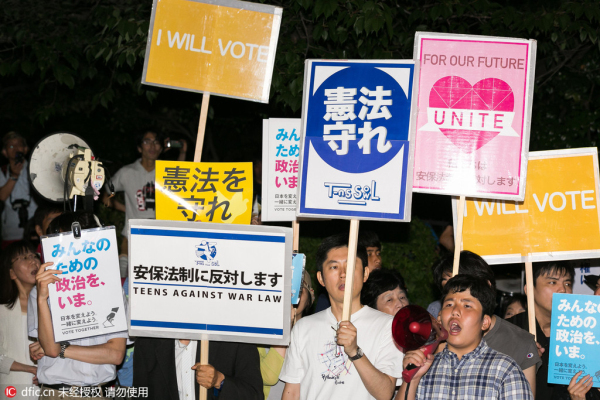Upper house victory may embolden Abe to revise Constitution
Updated: 2016-07-19 07:46
By Cai Hong(China Daily)
|
|||||||||
 |
|
Members of T-ns SOWL hold placards to encourage young people to vote in the summer's House of Councillors elections outside the Parliament building on June 10, 2016, Tokyo, Japan. The Teens Stand up to Oppose War Law (T-ns SOWL) is a voluntary activist group of high school students whose goals are to protect democracy and pacifism in Japan. This year's House of Councillors elections is the first time that 18 and 19 year old can vote, and demonstration organizers claimed that 1500 attended the event.[Photo/IC] |
Tatsuo Hirano, an independent member of Japan's upper house of parliament, or Diet, applied last week to join the ruling Liberal Democratic Party. His change of mind will give the LDP majority in the upper house for the first time in 27 years.
Together with its ruling partner New Komeito and the opposition parties that favor amending Japan's Constitution, the LDP secured more than two-thirds of the seats in the July 10 upper house election. This supermajority is important for the LDP and its leader and Japanese Prime Minister Shinzo Abe, who has been making efforts to rewrite the Constitution and make Japan a "normal" country.
Article 96 of the Constitution stipulates that for any amendment two-thirds majority is required in both houses of the Diet, along with the approval of a majority of the voting population in a referendum. The LDP-New Komeito coalition already has supermajority in the Diet's more powerful lower house, and despite not making the Constitution an issue in the upper house election, Abe said on July 11 that he takes the latest victory as a public endorsement for revising the Constitution and vowed to set up a parliamentary committee to discuss which articles to amend and how.
As a grandson of former Japanese prime minister and LDP co-founder Nobusuke Kishi, who despised the Constitution "imposed" on Japan by the United States in 1947, Abe has been desperate to rewrite it, or, to be more precise, remove Article 9 which states that Japan forever renounces war as its sovereign right and vows not to maintain military forces for that purpose.
In 2012, the LDP published a draft constitution that seemed to turn the clock back to a more traditional and controlled society. Most importantly, the draft included a complete overhaul of Article 9, recommending that Japan's Self-Defense Forces be turned into the "National Defense Force" with the prime minister as commander-in-chief.
Abe has already euthanized the pacifist Constitution by reinterpreting it to allow collective self-defense and having the security bills railroaded through the Diet. Besides, Tadae Takubo, chairman of Japan Conference, and ultraconservative political lobby, said at the Foreign Correspondents' Club of Japan in Tokyo on Wednesday that the group will do its utmost to capitalize on Abe's victory in the upper house election and push for constitutional revision to allow a more active Japanese military. The war-renouncing Constitution, in his words, makes Japan's defense "defective".
The group, founded in 1997, calls for building a strong army to defend Japan from the threats from China and the Democratic People's Republic of Korea. Its key members claim Japan waged a war of "self-defense", not a war of aggression, against the US and European countries during World War II.
About 280 lawmakers-or nearly 40 percent of all Diet members-belong to Japan Conference Diet Member Discussion Society. Abe may form commissions to review the Constitution in the two houses when the extraordinary session of the parliament convenes in autumn.
Given the split in Japanese society over constitutional revision, Abe may not rush to remove Article 9 but he could amend other areas in the Constitution to set a precedent for future revisionists.
The author is China Daily Tokyo bureau chief.
caihong@chinadaily.com.cn
Related Stories
Abe still peddling his own agenda 2016-07-18 09:44
Abe: Revising pacifist constitution not easy 2016-07-12 08:04
Abe looking to build consensus for change to pacifist Constitution 2016-06-27 08:36
Abe not averse to US bases in Okinawa 2016-06-24 19:56
Today's Top News
IS: Refugee attacker in Germany one of its fighters
Did Melania Trump plagiarize from Michelle Obama?
26 die after tour bus catches fire in Taiwan
Former Turkish air force chief confesses to plot coup
Arrests hit 6,000 as Turkey cracks down on army
Chinese tourism to France will 'drop' after attack
Terrorism is part of everyday lives for a long period
French city comes to terms with brutal terror attack
Hot Topics
Lunar probe , China growth forecasts, Emission rules get tougher, China seen through 'colored lens', International board,
Editor's Picks

|

|

|

|

|

|







